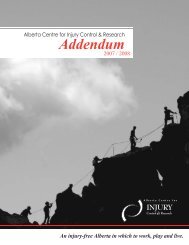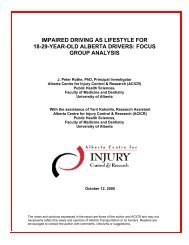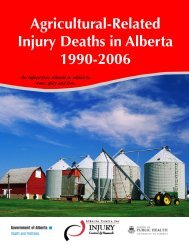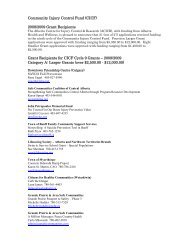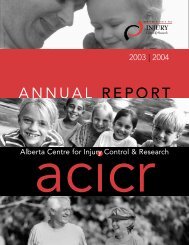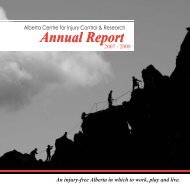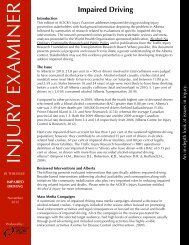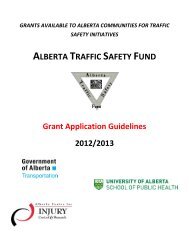Delegates Program - Alberta Centre for Injury Control & Research
Delegates Program - Alberta Centre for Injury Control & Research
Delegates Program - Alberta Centre for Injury Control & Research
You also want an ePaper? Increase the reach of your titles
YUMPU automatically turns print PDFs into web optimized ePapers that Google loves.
<strong>Alberta</strong> Alcohol Strategy<br />
Purpose<br />
To prevent and reduce alcohol-related harm by<br />
developing a culture of moderation.<br />
Outcomes<br />
• Reduce intoxication, heavy drinking and other risky<br />
patterns of alcohol consumption.<br />
• Improve community safety by reducing alcohol-related<br />
harm.<br />
• Increase public awareness of the risks associated<br />
with alcohol consumption.<br />
• Increase understanding among <strong>Alberta</strong>ns that social<br />
norms do not support a culture of intoxication.<br />
• Delay the onset of alcohol use.<br />
• Decrease the social and economic costs related<br />
to alcohol consumption.<br />
• Ensure effective policies and measures are in place<br />
to control the physical, social and economic availability<br />
of alcohol.<br />
• Communities have the capacity to respond to individual<br />
and family problems related to alcohol use.<br />
What we heard from <strong>Alberta</strong>ns:<br />
Key Themes<br />
The issue is complex – alcohol-related problems need<br />
to be addressed in conjunction with a host of other issues,<br />
including poverty, homelessness, unemployment and<br />
family violence.<br />
Build on what works – a broad range of community-based<br />
and government programs designed to reduce alcoholrelated<br />
harm currently exist but they are not consistently<br />
available throughout <strong>Alberta</strong>.<br />
Have a long-term vision – outline a comprehensive<br />
plan with clear and measurable results.<br />
Recognize diversity – programs must be culturally<br />
sensitive, age and gender-specific and developmentally<br />
appropriate.<br />
Respect the values of <strong>Alberta</strong>ns – <strong>for</strong> healthy and<br />
safe communities and the best quality of life possible.<br />
Strategic priorities and recommended<br />
actions<br />
1. Promote healthy perceptions, attitudes and<br />
behaviours toward alcohol use.<br />
• Incorporate the new national low-risk drinking guidelines<br />
(LRDG) in health promotion, education, workplace and<br />
alcohol treatment settings so that <strong>Alberta</strong>ns are in<strong>for</strong>med<br />
about their alcohol consumption.<br />
• Develop a sustained social marketing campaign to raise<br />
awareness about drinking patterns that cause alcoholrelated<br />
harm. The campaign should present clear,<br />
balanced and credible messages that are linked to similar<br />
communications at the national, regional and community<br />
levels, including the National Alcohol Strategy.<br />
• Develop educational resources to improve the health<br />
and safety of high-risk groups, such as underage drinkers<br />
and their parents, young adults who over-drink, women<br />
who are pregnant or plan to become pregnant, and<br />
seniors.<br />
• Ensure that in<strong>for</strong>mation about alcohol use is consistently<br />
included in policies and programs focused on preventing<br />
and treating chronic disease.<br />
2. Ensure social responsibility in the production,<br />
distribution, regulation and service of beverage<br />
alcohol.<br />
• Routinely review and report on <strong>Alberta</strong>’s alcohol<br />
regulatory system to identify and implement changes<br />
that promote moderate and responsible alcohol<br />
consumption. This includes review of licensing, pricing,<br />
mark-up system, promotional activities, server training<br />
programs and regulatory en<strong>for</strong>cement practices.<br />
• Encourage industry to establish, implement, en<strong>for</strong>ce<br />
and evaluate <strong>for</strong>mal standards and codes of practice<br />
that support responsible alcohol consumption.<br />
• Work with provincial partners to review advertising<br />
standards to ensure that these comply with a social<br />
responsibility mandate.<br />
• Educate the public about liquor licensing, liability<br />
concerns and hosting responsibilities.<br />
Page 1



